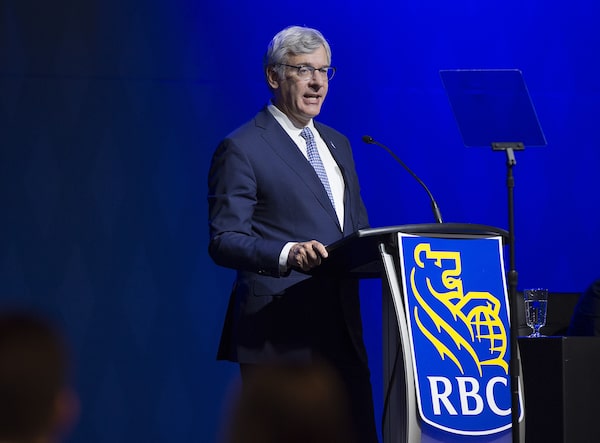
David McKay, president and CEO of the Royal Bank of Canada, addresses the company's annual meeting in Halifax on April 4, 2019.Andrew Vaughan/The Canadian Press
Royal Bank of Canada RY-T chief executive Dave McKay said that the country is at a “critical moment” on climate change as investors and Indigenous groups criticize the bank’s continued lending for fossil-fuel projects.
At an annual shareholder meeting on Wednesday in Saskatoon, Mr. McKay said that Canada’s largest lender can make the greatest impact by partnering with clients to advise on reducing emissions, rather than ceasing the financing of those projects altogether.
After his remarks, investors dominated the three-hour meeting by denouncing the lender for its measures to address energy and environmental concerns, including financing for projects such as the Coastal GasLink pipeline.
Mr. McKay said that geopolitical tensions and the rising cost of living complicate divestment from oil and gas production in the near term. He added that cutting off support for the energy industry without adequate alternative sources would cause a “disorderly transition.” He pointed to energy shortages in Europe that drove governments to sponsor more coal plants to meet demand for heat and electricity.
“An insecure journey will be significantly inflationary if we stop producing fossil fuels” Mr. McKay said in response to shareholder questions. “We do not have enough wind, solar, nuclear and hydro power right now to keep our society going. And therefore if we’re not smart about this, we risk that journey.”
He highlighted RBC’s initial set of interim targets aimed at helping its clients cut carbon emissions in heavily polluting sectors by 2030. The initiative seeks to reduce the intensity of emissions – reductions per unit of economic output, rather than absolute cuts – in the oil and gas, power generation and automotive sectors.
When the bank announced the targets in October, its executives said that the lender may need to continue directing money to certain industries for now to drive their decarbonization efforts. RBC was the last of the Big Five banks to announce 2030 emissions targets.
A few weeks earlier, Canada’s Competition Bureau launched an inquiry into allegations that Royal Bank of Canada made misleading statements about its actions to combat climate change. The bureau had received an application from citizens backed by environmental groups.
RBC heard a stream of concerns from shareholders after Wet’suwet’en leaders were directed to a separate room to view the meeting and ask questions virtually. They had planned on attending the meeting in person in the main room to express their opposition of the Coastal GasLink pipeline, accusing RBC of enabling damage to Indigenous lands.
RBC said that it had set up the second room to accommodate more people, spokesperson Gillian McArdle said in an e-mail. The Indigenous groups were moved to the separate room because the in-person site was already full, she said.
Mr. McKay told shareholders that the pipeline allows Indigenous groups to take economic stakes in the project to use the profits for community infrastructure and education.
Wet’suwet’en leader John W. Ridsdale, who also goes by the hereditary chief name Na’Moks, said that RBC is solely focused on monetary gain, neglecting the needs of his community and ignoring Wet’suwet’en sovereignty.
“When their CEO was speaking, he wanted everyone to think it’s all about money and they’re doing great things to help the economy,” Mr. Ridsdale said during a news conference in Saskatoon. “I can’t help but think of the financial deficit in this country. But today they proved that there is a moral deficit in this country.”
Shareholders rejected several climate-related proposals at the meeting. They also voted against a call for RBC to conduct a “racial equity audit” to have a third party review its employment, compensation and business practices, including how it sells products and services. RBC recommended that shareholders reject the proposal, telling them in its proxy that it doesn’t want to do an audit until the banking industry develops standards that apply to all companies. Even so, 44 per cent of shareholders voted in favour.
Three other large Canadian banks have already adopted similar shareholder proposals, including Canadian Imperial Bank of Commerce CM-T, National Bank of Canada NA-T and Toronto-Dominion Bank TNTTF.
Royal Bank of Canada is the third Big Six lender to hold its meeting for shareholders, with CIBC and Bank of Nova Scotia completing theirs on Tuesday.
The industry faces mounting challenges amid concerns over a recession and the fallout of Silicon Valley Bank’s failure. Mr. McKay said that the banking sector is “stable and resilient” and that RBC’s diversified business and strong deposit base set up its foundation to weather market turbulence, even as confidence in the sector wavers.
The bank is also in the midst of seeking regulatory approval on the biggest domestic banking takeover in the country’s history. RBC’s planned acquisition of HSBC Canada is a “once-in-a-generation deal,” Mr. McKay said.
“This is our largest acquisition ever in a market that we know best and gives us the chance to add a complementary business that will take the combined client experience to the next level,” he said. “The acquisition will position us as the bank of choice for newcomers to Canada and globally connected clients.”
 Stefanie Marotta
Stefanie Marotta